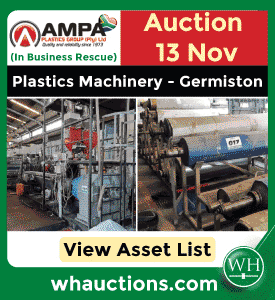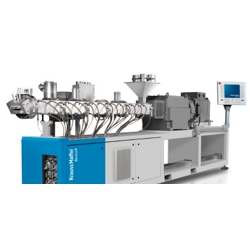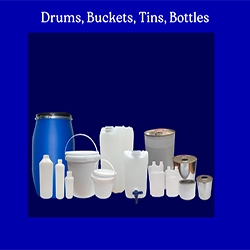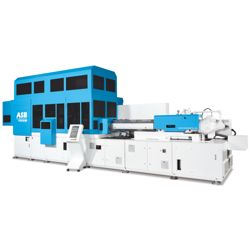Growth in Plastics Recycling Industry
Submission Date : 2017-12-06
Plastics|SA 2017 AGM Highlights Importance of Circular Economy

Johannesburg, 29 November 2017. Plastics|SA, the umbrella body representing all sectors of the South African Plastics Industry (including polymer producers and importers, converters, machine suppliers, fabricators and recyclers) hosted a well-attended Annual General Meeting for 2016-2017 in Midrand last week.
Addressing the audience members, Plastics|SA Chairman, Bernhard Mahl stated that 2016 marked the lowest economic growth rate since 2000, barring the 2009 recession. “South Africa is a diverse country in terms of its resources and poses extreme challenges to an industry that is trying to create a more fertile environment for growth on the socio-economic front,” Mahl said. He added that political uncertainty constitutes the biggest stumbling block to foster GDP growth and it continues to weigh heavily on business confidence and delay future investment that could have boosted the local plastics industry.
Growth in manufacturing production and virgin material consumption

Despite these challenges, seasonally adjusted manufacturing production increased by 1,3% in the three months ended August 2017 compared with the previous three months. “Six of South Africa’s ten manufacturing divisions reported positive growth rates over this period. The second largest contributions to the reported increase were made by petroleum, chemical products, rubber and plastic products (1,6% and contributing 0,4 of a percentage point). In addition, 2016 also saw a 1.9 % growth in virgin material consumption (to 1,518 000 tons per annum),” Mahl said.
“Plastics continue to be an integral part of our modern society and have proved indispensable. However, locally and internationally, there is an increasing amount of pressure from certain groups to ban the plastic bag and other single use plastics. This highlights the importance of effective plastic waste management and the plastics industry will have to innovate and adapt if it is to survive this negative wave,” Mahl warned.“Plastics should not only be seen as bags, straws and litter, but rather as a valuable enabler of quality of life required by a modern society, such as used in road and air transportation, communication and networking, leisure, entertainment,health and safety.
Growth in plastics recycling
Plastics|SA Executive Director, Anton Hanekom highlighted Plastics|SA’s various successes achieved this past year, most notable being the 5,9% increase in the recycling rate of plastics and diversion of waste from the country’s landfills.
"The latest plastics recycling rates clearly show that we are not merely paying lip service to our sustainability promises and commitments. As an industry, we are now diverting approximately 330 000 tons per annum from landfill. The leading markets for recycled material continue to be packaging, building and construction and the automotive industries,” Hanekom said. “South Africa currently only makes use of mechanical recycling, as no other commercial facilities currently exist for alternative plastics recycling. Compared to Europe’s mechanical recycling rate of 29.7 %, South Africa can indeed be proud of its recycling rate of 41.8 % for all plastics”.
Public-private partnerships
Another highlight of Plastics|SA’ssuccesses this past year, was the forming of various Public-Private Partnerships aimed at stimulating and building relationships with Government.
“The purpose was to create solid relationships and to set up forums where the industry leaders can openly engage in dialogue with Government on matters that impact their business. This has proven to be very successful and mutually beneficial. We are seeing the positive results from these engagements. A recent opportunity was to present at the Portfolio Committee on Environmental Affairs’ parliamentary colloquium on ‘Maximising the Circular Waste Economy in South Africa’. These discussions will guide future plans on the waste economy and will continue to be one of the association’s strategic initiatives going forward,” Hanekom said.
Plans to increase employment
Plastics|SA is currently collaborating with a number of manufacturing industry associations in the ‘MAP-to-a-Million’ initiative which aims to create a million jobs by strengthening and growing the manufacturing sector in South Africa.
“Our first step is to identify bottlenecks and constraints that the manufacturing sector is facing. It will highlight remedies and support required from Government and indicate the expected growth in the manufacturing sector and ultimately the plastics industry,” Hanekom said.
Looking forward
Looking at what the future holds for the local plastics industry in the short-to medium term, both Hanekom and Mahl stressed the importance of the circular economy becoming the new roadmap to ensure sustainable growth.
“Plastic products are so much more than just the once-used shopping bags, straws and litter that have come under fire recently. We make valuable contributions to transportation, road and air quality, water and sanitation, communication and networking, health and safety, leisure and entertainment. Plastics are lightweight, versatile and durable and allow us to make a strong contribution to a more environmentally sustainable South Africa by saving energy and major resources - such as food and water - across the different sectors, including packaging, building and construction, automotive, etc.
By adopting and embracing the circular economy, we are able to redesign systems and processes for a more sustainable future. A change in the global and local economy brings potential for innovation, job creation and economic growth. We look forward to bringing key stakeholders together, applying the principles of the Circular Economy, and building momentum to rethink the future of plastics to ensure that nothing we produce becomes waste”.
















